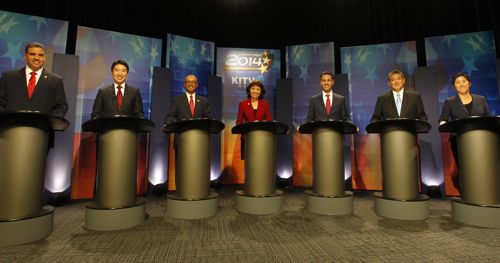7 Democrats debate congressional issues in televised forum

CTY - From left, Democratic Congressional candidates Council member Ikaika Anderson, Council member Stanley Chang, State Senator Will Espero, State Senate President Donna Mercado Kim, City Councilman Joey Manahan, State Representative Mark Takai, and Kathryn Xian stand at their podiums prior to the start of the Congressional District One debate at KITV studio on Wednesday, July 23, 2014 in Honolulu. (Honolulu Star-Advertiser/Jamm Aquino).
City Councilman Ikaika Anderson stood out on Wednesday as the only Democratic 1st Congressional District candidate to still fully support the U.S. Department of Interior’s continuing to look at re-establishing a government-to-government relationship with Native Hawaiians.
Anderson, the only Native Hawaiian among the seven Democrats, took the stand at a fast-paced and wide-ranging forum on KITV Wednesday night, saying it’s critical to allow the process, proposed by President Obama, to continue in order to ensure that existing Native Hawaiian entitlements and programs — such as the Department of Hawaiian Home Lands, the Office of Hawaiian Affairs and Kamehameha Schools — can continue.
“I’m extremely concerned that the next lawsuit that comes to one of these Hawaiian entitlement programs and reaches the Supreme Court that we are going to be in dire trouble,” he said. “And the only way to ensure that we can protect what is currently in place is for some type of government-to-government relationship right now,” Anderson said. Past wrongs can then be addressed, he said.
Other candidates were either more cautious about embracing, or outright against continuing, Obama’s initiative. Many cited the overwhelming testimony rejecting federal recognition given by Native Hawaiians during recent hearings held by the Department of Interior.
Community activist Kathryn Xian said she supports “a self-determination process focused on and led by Native Hawaiians … and I’m talking the entire Native Hawaiian community.” Most who testified said they don’t want a government-to-government relationship, she said. “They deserve … Hawaiian national independence and that is what I would support.”
State Senate President Donna Mercado Kim said any move to re-establish a Native Hawaiian government needs to be sensitive to the fact that the Hawaiian kingdom was overthrown “through force and through violence.” She added: “This determination and this government has to be decided by the Hawaiians. It should not be up the Department of the Interior.”
Don't miss out on what's happening!
Stay in touch with breaking news, as it happens, conveniently in your email inbox. It's FREE!
Councilman Joey Manahan said he also believes in self-determination but also in “a government-to-government relationship rather than one of a tribe.” The Apology Resolution adopted by Congress and signed by former President Bill Clinton in 1993 reaffirmed that, he said.
State Rep. Mark Takai said “what happens to Native Hawaiians needs to be determined by them.” Takai said he supports the process now taking place locally through the Native Hawaiian Roll Commission, known as Kana’iolowalu, and facilitated by OHA through former Gov. John Waihee. The recent Interior Department proceedings showed “there is no clear path” to what Native Hawaiians want, he said.
State Sen. Will Espero said the efforts of veteran Sens. Daniel K. Inouye and Daniel Akaka to push through the Akaka bill were unsuccessful. “This shows that we need to go back to the table to see what it is best for the state of Hawaii, the Native Hawaiians and also the non-Native Hawaiians.” Options include maintaining the status quo, having the issue go to an international commission, establishing a nation-within-a-nation relationship “or even an independent nation,” Espero said.
Councilman Stanley Chang said that more than 150 federal statutes, including the Apology Resolution, codified the special relationship between the U.S. and Native Hawaiians. “It’s our responsibility as elected officials to facilitate an open, transparent, consensus building process that ultimately relies most fundamentally on the self-determination of the Native Hawaiian people in determining the relationship of their people to the United States government and the exact nature and principles of a self-governance system,” Chang said.
In the most unusual question of the night, moderator Yunji de Nies asked each of the candidates to pick which fellow candidate they would support for the seat if they, themselves were not running.
Chang said he would support Xian, describing her as “a private citizen who’s devoted her life’s work to making life better for victims of trafficking, for children, for people with mental illnesses.”
Takai said he would support Manahan, whom he previously supported. “He’s worked hard as a member of the Legislature and also now as a member of the City Council and he’s earned my respect.”
Anderson said he would also support Manahan, noting that “I admire his work ethic … he’s very hard-working, he cares about the people he represents, and he’s got a solid puuwai, heart.”
Kim said she would vote for Takai because they have worked together at the Legislature on various issues, including those involving the University of Hawaii. “We get along quite well and I respect Mark.”
Espero said he would support Takai. “He’s a family man, he’s a product of our public schools and the University of Hawaii and he has an appreciation for the military as he’s a member of the Army National Guard.
Manahan said he would support Takai. “He’s worked hard on his campaign, he’s got the momentum and he’s a hard worker.”
Xian said she would back Manahan. “I would have to say that his responses and his answers to the public are very sincere and that’s something that you can count on.”
Final tally: Manahan, 3 votes; Takai, 3 votes; Xian, 1 vote.
The forum was the second and final televised appearance by all seven Democrats before the Aug. 9 primary. Republicans in the race are former U.S. Rep. Charles Djou and Allan Levene, and nonpartisan candidates Calvin Griffin and Robert H. Meyer.



